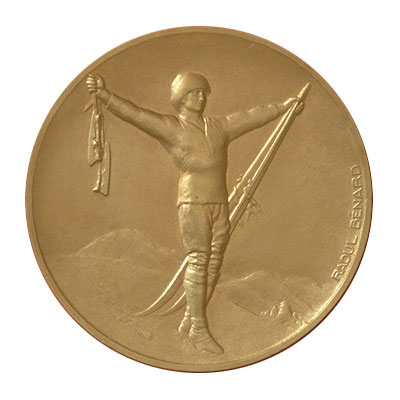
Right at this very moment, the 2014 Winter Olympics are going on and people are preparing to work their bodies to the extremes, in order to win the gold medal. The Olympics are a special event that occurs every 4 years and allows extraordinary people to show off their skills around the world and compete to brake world records. The sports shown in the special games include; figure skating, snowboarding, and freestyle skiing, along with many others that are familiar and some that aren't very common, like curling. Not only do the Olympics happen in the winter, there are also games in the summer.

Early in 1921 the International Olympic Committee announced that a winter sports week would be held to allow people around the world to compete against one another. In 1924, the first winter Olympic games were held in Chamonix, France and attracted an astonishing 10,004 paying viewers. American Charles Jewtraw was one of the first people to obtain a medal in the 500m speed skate. Although in the case of the first winter Olympics, medals were not given until the ceremony that was held at a later date than the actual games. One tradition that hasn't stuck with us requires the people in the games to wear all of their gear during the opening ceremony when the torch is lit and a speech is given. Now, the members don't have to wear all that gear but still need to show which specific country they are from(what team they are on). I suppose the most famous part of all is when the winners claim their medal that they have trained so hard for. The medals were really a work in progress when they finally found what they would do with them. A skier holding their gear with the alpine mountains in the background. Many copies were made in the amazing town of Paris where the metal for the pendants were best made. The games are a big deal to others and nationally astonishing, so go home tonight and turn on the 2014 Winter Olympics that have been a tradition for so
many years.
sources:
http://www.olympic.org/chamonix-1924-winter-olympics
www.socialstudiesforkids.com/graphics/olympics_medal_1924_winter.jpg
http://i.imwx.com/web/multimedia/images/miscellaneous/olympics130_320x180.jpg
 Breaking news! One name has swept the nation. George Woolf, a Canadian horse racer made history when he and his horse Seabiscuit won and beat the track record at Pimlico, Maryland. Woolf began racing thoroughbreds professionally in 1928, riding 150-200 races each year after that. When Woolf finally was considered Americas leading jockey, he was diagnosed with type 1 diabetes and thought his career was over but was able to overcome that obstacle and push on to win ninety-seven major stakes races. Considered the underdog of all the races, Seabuscuit was a small stature horse that nobody thought would win but amazingly was quick on his feet. The Thoroughbred race horse brought hope to the Americans when there seemed to be no hope. Seabiscuit showed Americans that even the small and wrongly judged can make history and even bring confidence that things will get better. Rode by a rider who didn't push him on to be his best, Seabiscuit was put away until George Woolf found him. A frisky horse he was. Was only nice to those certain people who he had grown fond of. But there was something special about these two's relationship. When they ran they were not two but one with each other. George Woolf truly found his perfect match, and together they made history.
Breaking news! One name has swept the nation. George Woolf, a Canadian horse racer made history when he and his horse Seabiscuit won and beat the track record at Pimlico, Maryland. Woolf began racing thoroughbreds professionally in 1928, riding 150-200 races each year after that. When Woolf finally was considered Americas leading jockey, he was diagnosed with type 1 diabetes and thought his career was over but was able to overcome that obstacle and push on to win ninety-seven major stakes races. Considered the underdog of all the races, Seabuscuit was a small stature horse that nobody thought would win but amazingly was quick on his feet. The Thoroughbred race horse brought hope to the Americans when there seemed to be no hope. Seabiscuit showed Americans that even the small and wrongly judged can make history and even bring confidence that things will get better. Rode by a rider who didn't push him on to be his best, Seabiscuit was put away until George Woolf found him. A frisky horse he was. Was only nice to those certain people who he had grown fond of. But there was something special about these two's relationship. When they ran they were not two but one with each other. George Woolf truly found his perfect match, and together they made history.

